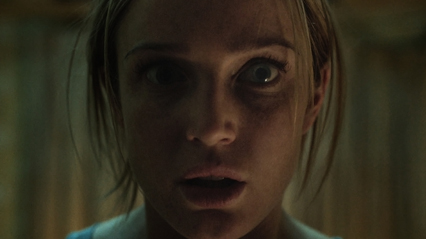

By Kim Voynar Voynar@moviecitynews.com
Sundance Review: The Pact
The Pact, directed by Nicholas McCarthy, played here at Sundance as a short film last year, and came back this year as a full-blown feature. Now I’m not much of a horror chick, though I do occasionally enjoy a good scare. For me (and, I’d have to say, a sizable percentage of the public screening midnight crowd with whom I saw it), The Pact delivers plenty of chills, jumps and squeal-worthy moments.
The storyline centers on Annie (Caity Lotz, by far the best thing about the film as a pretty kick-ass heroine), who reluctantly returns home for her mother’s funeral at the insistence of her recovering addict sister (Agnes Bruckner) to find that the sister has disappeared. No one’s terribly concerned about this, since she’s an addict who’s vanished before, but then things start to get freaky. Things go bump in the night, lights flicker, Annie gets tossed around by an unseen presence, and her cousin, who came to spend the night at the house with Annie’s young niece following the mom’s funeral, also disappears. Now personally, at the point that I was being tossed around the house where I spent my traumatic childhood by something unseen and people were disappearing, I would have gotten the hell out of there and stayed gone, missing sister and cousin or no. But this is a horror film, and people are always doing stupid things in horror films. That’s part of the fun, right?
So Annie enlists the help of an inept, gravelly-voiced detective (Casper Van Dien) and a former classmate who can communicate with ghosts (now that’s a handy skill set to have around when your house is haunted) to unravel the mystery of the missing women, the haunted house, and how everything is all tied together. I wouldn’t say McCarthy necessarily ties all these plot bits and pieces together in the most cohesive way, but he has made a film that delivers plenty of jump scares and decently tense moments. Certainly there were plenty of jumps and squeals throughout the audience, including from me. You’ll have to take that with the grain of salt that I am a huge wimp about horror, the kind of chick you snicker at because she’s peeking through her fingers every time the tension amps up. And I was peeking through my fingers a lot while watching this film.
That said, The Pact is not without its problems, some of which feel like they might have been caused by the director feeling too much pressure to rush to get this feature done for this year’s fest rather than aiming for 2013, which would have maybe given him more time to really hone and tighten up the script. There are certainly plot holes and inconsistencies, but I tend to see that in a lot of horror films, even ones I really liked (Teeth, Grace, Black Sheep and Paranormal Activity, to name just a few, all have some pretty glaring issues with logic and plot holes, but that didn’t render them without entertainment value). With The Pact, I was engaged enough in the tension of the film to not particularly care about most of it’s problems while I was watching the film.
McCarthy is strongest as a director here when he’s focused on building suspense and jolting the audience, less so when he’s directing his actors. And from a story standpoint, I wish he’d focused a little more on who these characters are, because even Annie, the protagonist, lacks a full developed scaffolding that defines who she is, what her real needs and desires are; that in turn contributes to many of the plot holes in the story. This feels to me like a script where they started with a seed of an idea, built the plot up, then fit the characters into that, than a script that started from who the characters are and letting the story flow from there. McCarthy maybe could have used more guidance in figuring those issues out and weaving a tighter fabric to build the tension and suspenseful moments upon.
Still, Lotz makes for a kick-ass horror film heroine, and I thought the film overall played quite effectively to the midnight crowd despite its flaws. If it gets picked up for distribution, it could use some re-editing to tighten up the structure of the story (of course, that’s easy enough to say without knowing if they shot the coverage to do that). With some tweaks and the right marketing approach, The Pact could play well, albeit probably more as a horror flick targeted at teens and folks like myself who are easier scares, than for the real horror connoisseurs.















